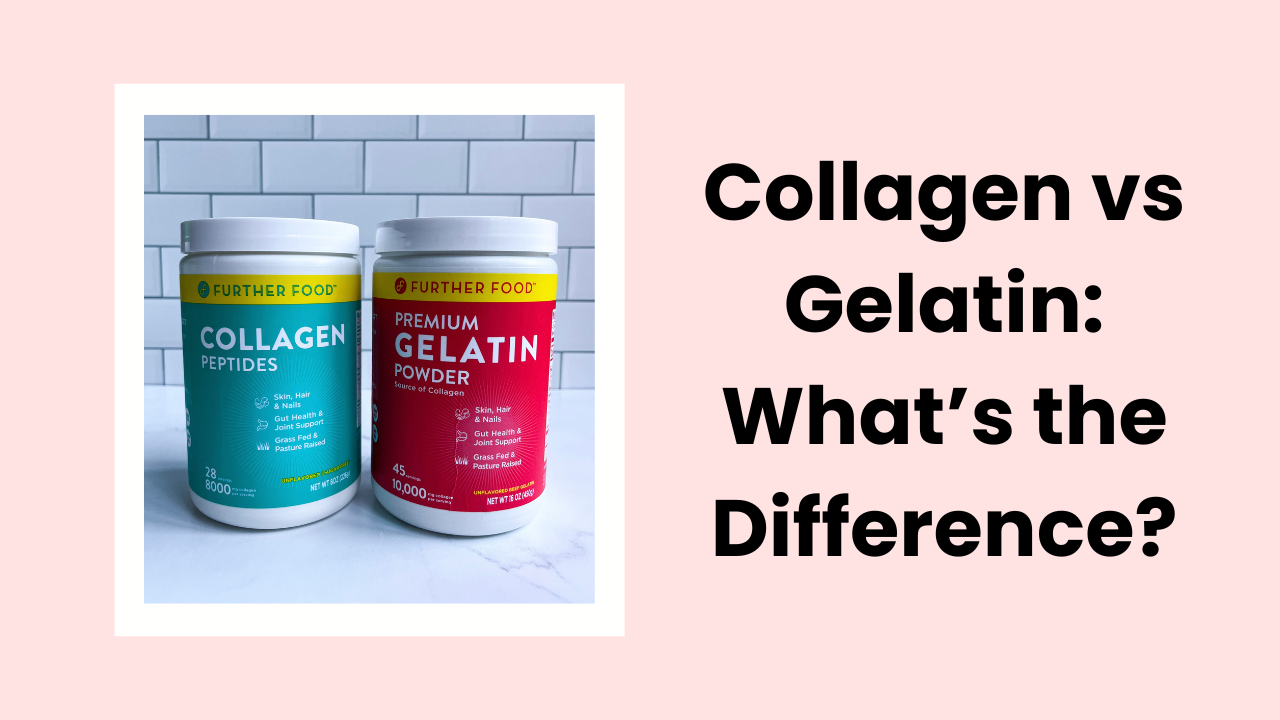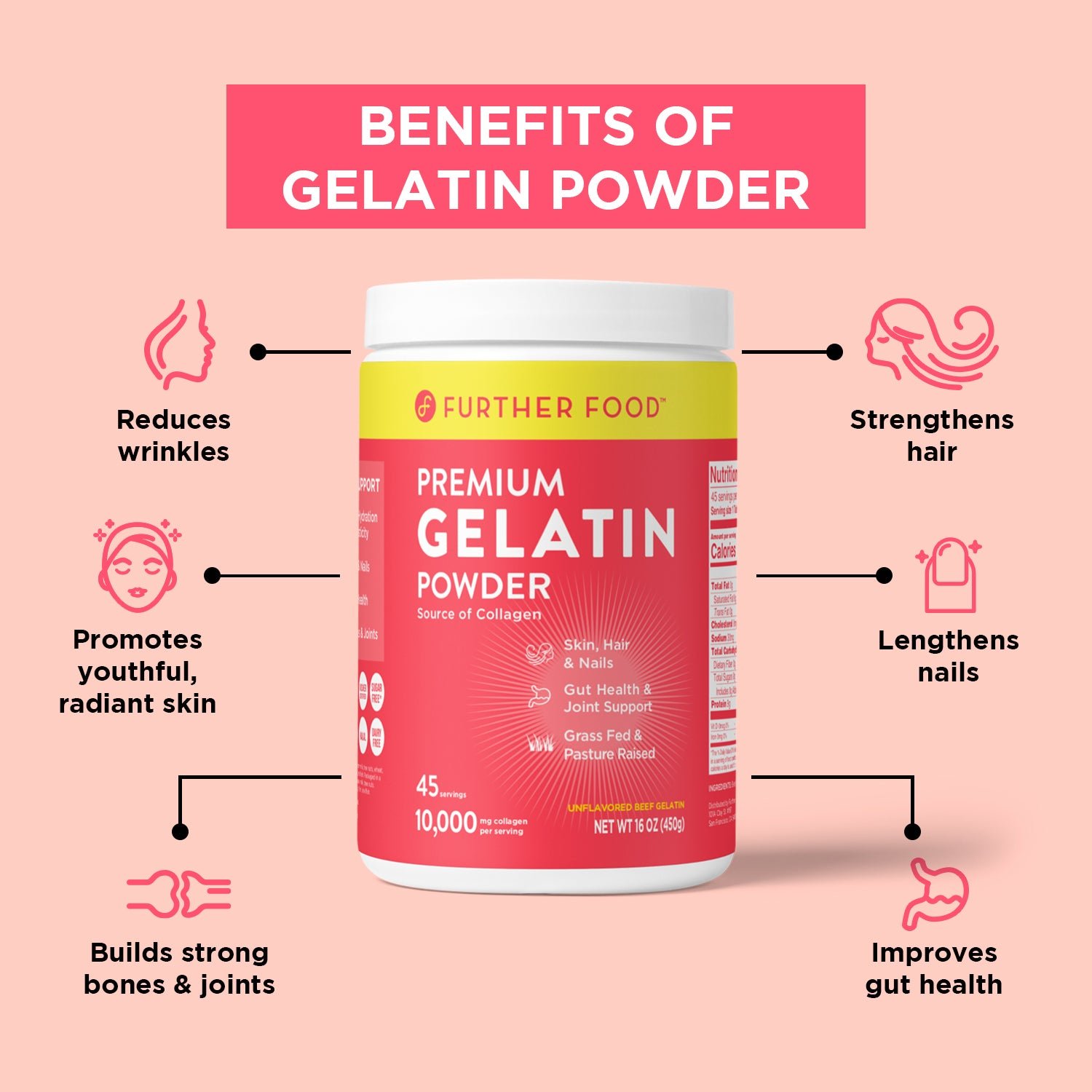Collagen vs Gelatin: What’s the Difference?
Sep 19, 2022
If you've heard of collagen before, you've probably heard the term gelatin as well. But with all the different collagen supplements out there, from hydrolyzed collagen to collagen hydrolysate to collagen pills to gelatin BEING collagen, it can be hard to navigate what's what! In this post, I give you the full rundown of what gelatin is and how it compares to collagen.
In this article:
-
What is collagen?
-
How is collagen produced?
-
How is gelatin produced?
-
What’s the difference between collagen and gelatin?
-
Collagen vs gelatin: which is better?
-
What to look out for when buying gelatin

The terms collagen and gelatin are thrown around a lot in the health and fitness world, and for good reason! High-quality collagen and gelatin supplements can promote strong bones, skin, hair, nails, and aid in the healing of the gut lining. However, these two supplements are NOT the same and act very differently when it comes to their usage in everyday life.
What is Collagen?
Before we can understand what gelatin is and how it differs from collagen, it's important to have a clear understanding of what exactly collagen is, how it is made, and potential reasons for taking it.
Collagen is the most abundant source of protein in our bodies. It is the “glue” that holds our bodies together and is a key component of our skin, muscles, bones, connective tissues, and cartilage. The word “collagen” itself comes from the Greek word “kolla” meaning “glue”!
Like all proteins, collagen is made up of smaller chains of amino acids. Your body makes collagen from the amino acids proline, glycine, arginine, and hydroxyproline, all of which come from food. However, some of these amino acids are harder to come by. Hydroxyproline, for instance, is found almost exclusively in collagen from animal sources.
There are over 28 different types of collagen, but 80-90% of the collagen in our bodies is made up types 1, 2, and 3. There are also different sources to obtain collagen from, the most popular being bovine collagen (made from cowhides) and marine collagen (made from fish skin). To read more about collagen, its benefits, and why I personally make sure to have a scoop every day, check out my post Everything You Need to Know about collagen!

How is Collagen Produced?
Any type of collagen supplement starts in the source it is made from, usually cows or fish. Sourcing hides from healthy, happy cows and skin from wild-caught fish is critical to get the best quality collagen supplement that is also good for the planet.
When you look back at the eating habits of our ancestors, eating an animal nose-to-tail including nutrient-rich organ meat and connective tissue was common across many cultures. Today, however, people mostly eat just muscle meat which lacks the amino acids that can be found in other parts of the animal, such as in hides and tendons. Luckily, these by-products of the meat industry can be "upcycled" and turned into high-quality health products such as collagen hydrolysate and gelatin!
To create collagen peptides, otherwise known as hydrolyzed collagen or collagen hydrolysate, cowhides or fish skins are soaked in extremely hot water to extract the collagen. After a series of evaporation and milling techniques, hydrolyzed collagen powder that can easily be dissolved into liquid is the result!
How is Gelatin Produced?
The production process is where the difference lies when it comes to understanding how collagen and gelatin compare. When bones, tendons, and ligaments, or hides of an animal are cooked, the release of collagen can occur. When you cook these animal products long enough, the amino acids are broken down into smaller molecules, changing the chemical properties of the protein. This is what gives gelatin its unique ability to "gel" once heated and allowed to cool. After cooking, these smaller components are extracted, filtered, then dried into sheets for cooking, or powdered for products like gelatin supplements.

But then what's the difference?
Both collagen and gelatin supplements start with the cooking of collagen-rich animal parts such as ligaments, tendons, and/or hides, so you may now be wondering, what is the difference? In terms of nutrition collagen peptides and gelatin are actually equal; the difference lies in the chemical properties!
Gelatin is basically cooked collagen. To create gelatin, you heat collagen slowly for a long period of time. Think of simmering down bones, ligaments, and tendons for hours on end to make a rich, jelly-like stock. When you heat the collagen-containing animal parts in this way, the collagen proteins go through a denaturing process, meaning the proteins unravel and take on a different structure. This new structure causes the chemical properties of the amino acids to change. Collagen that’s denatured turns to liquid gelatin when hot, but jellifies as it cools.
When we're talking about collagen powder or collagen peptides, it's important to know that this means you're talking about hydrolyzed collagen, otherwise known as collagen hydrolysate. To create collagen powder, the collagen from the animal products undergoes a more intense process called hydrolyzation. After cooking the original collagen to create gelatin, the proteins are broken down even more into smaller, more easily dissolvable amino acids that are called peptides. Hence the names hydrolyzed collagen, collagen hydrolysate, and collagen peptides! They're all the same thing :)

Which is Better?
If collagen and gelatin are essentially the same things, which is better? Well, that totally depends on your personal needs! If you are looking to improve your skin, hair, nail, and joint health, either supplement would be a perfect option. If you're looking for convenience, collagen may be the better option because it can be dissolved into anything; from coffee to smoothies and more! The easy dissolvability of collagen can be preferable as opposed to gelatin, which needs to be heated and allowed to cool for optimal results. But this exact property "gelling" is also a reason why you may prefer gelatin!
Because of its unique chemical properties to form a gel once heated and cooled, gelatin can be a great addition to your pantry for an abundance of recipes. Think about homemade gummies, pies, puddings, and the thickest overnight oats you will ever eat! Recently, I’ve been blending it into my coffee and the result is the most INSANE froth! If you're looking for a supplement to promote gut health, gelatin may also be the better option for you. It aids in the transport of fluid through the intestines and can even cover the lining of the digestive tract to create a protective layer; ideal for healing symptoms that come with as leaky gut or IBS! Gelatin powder is also an excellent supplement for individuals with autism, as a majority of neurodivergent individuals struggle with digestive issues. As an autistic and ADHD individual myself, I can personally attest to collagen supplements improving my overall quality of life!
What should I look out for?
When buying collagen and/or gelatin supplements, it's important to be wary of the source of the product. As I mentioned in my post all about collagen, make sure you're buying collagen from grass-fed cattle if opting for Bovine or Beef Collagen. If going for Marine Collagen, make sure it's from wild-caught and/or sustainably sourced fish. Further Food is my favorite brand when it comes to collagen supplements, as they’re women-owned and all of their collagen is sustainably sourced! My code LIVLABELFREE gets you a 15% discount on your entire purchase if you order via the Further Food website :)
The same goes for gelatin. Most gelatin supplements are made from bovine or beef collagen, so again, make sure you see the grass-fed label! It's also important to check for pure gelatin without any additives or fillers because we don't need that sh!t! Your body only needs the pure stuff :) My go-to gelatin supplement is Further Food Gelatin Powder because it's 100% pure gelatin made from grass-fed, pasture-raised beef hides. Further Food has a 100% satisfaction guarantee, meaning if you don’t love their products as much as I do, you’ll get a FULL REFUND, no questions asked!
I hope this post was helpful for you and gave you the information you were looking for regarding collagen and gelatin. If you have any questions or just want to leave your feedback on this post, drop a comment below or contact me!




